|
As I was reading the story of Moses and the burning bush recently, I thought about how Moses saw something that caught his attention and then paused to stop and be curious about it. As a result, he encountered and heard from God. I wondered if there had been other burning bushes prior to that day but Moses had been too distracted or preoccupied to notice. Or perhaps God had tried to get Moses’ attention in other ways on other days. We don’t know. What we do know is that on this day, Moses was paying attention, and that opened him to hear God’s invitation to embrace and participate in the vision of freeing God’s people. As I continued to reflect on the story, I heard in my spirit: “Today is a day to remember one of your own burning bush moments.” I sat with that perplexing thought for a moment, and then suddenly I knew what it was. About eight years ago during a group activity at a work retreat, God very unexpectedly but unmistakably planted the seed of a vision within me—to be in ministry with my husband, Neil, who is a counselor. I didn’t know what that meant at the time, and it would take several years of discernment and then several years of training as a spiritual director before we would begin to have a hint of “shared ministry” as we led a few small groups together. Now, on this day, we would have our first ministry session together with a couple preparing for marriage—each of us bringing our unique training and insights as well as our shared experience of leading others through the resource “How We Love.” I recognized the significance of this day—of having eyes to see God’s vision taking shape—and I was filled with overwhelming gratitude. Gratitude for that “burning bush” moment at the retreat all those years ago, gratitude for the journey of discernment that led to the path of spiritual direction, and gratitude for all that God has done and is doing. It seemed important not only to remember my burning bush moment but also to share it, giving God all the glory. There are potential "burning bush" moments every day. All we have to do is pay attention, be curious, and listen. Perhaps you will be encouraged, as I have been, by the realization that there are potential “burning bush” moments every day. All we have to do is pay attention, be curious, and listen. They’re usually not “spectacular” or miraculous events but ordinary moments when God breaks through the mundane. In fact, that’s God’s specialty—communicating to us through everyday moments we might be tempted to overlook or dismiss. God wants to speak to you through your “burning bush.” Just be attentive, curious, and ready to listen.* *If you're uncertain how God is communicating with you, meeting with a spiritual director can help you to become more aware of and attentive to God's presence and activity in your life. Talking with a trusted spiritual companion about what you sense God is saying and doing—as well as your doubts, fears, and questions—helps to bring clarity and facilitates the process of discernment. Spiritual direction creates a safe space where you can be seen, known, and loved as your authentic self and deepen your relationship with God—the one who knows you best and loves you most.
0 Comments
If you’re online, you’ve probably seen at least one of the Holderness family’s funny music parody videos (theholdernessfamily.com). They’ve been especially relatable and entertaining this past year as we’ve all been walking through this unprecedented pandemic wilderness experience together. Believe it or not, Kim Holderness is an introvert, and recently she wrote about needing to ease back into social activity after this long season of isolation. (She admits extroverts will feel very differently about that!) Kim says when it comes to all sorts of relationships, she approaches them the way she gets into a pool—slowly and deliberately. She writes, “I take my time, but once I’m in, I’m loyal for life” ("To My Friends Who Keep Showing Up"). I can relate to that. I’ve always been one to ease into the pool—both literally and figuratively. But once I’ve waded into a relationship, I’m “in.” Even if I haven’t seen or talked to someone in a while, I carry them in my heart, always ready and eager to reconnect without skipping a beat. For those who have the desire to maintain an active, reciprocal friendship, I’m like a Collie—as loyal as they come. But one of the most valuable lessons I’ve learned is that others approach relationships differently. Some of us are more like Labradors, always eager to make new friends and embrace change. Others of us might be more similar to a Bloodhound by being drawn to our work or callings and seeing friendships more as bonuses than necessities. None of these approaches is necessarily “right” or “wrong,” only different. And it's important to understand and accept our differences while learning to navigate them in a way that leads to health rather than harm. It's important to understand and accept our differences while learning to navigate them in a way that leads to health rather than harm. Regardless of our approach to relationships, there is one thing that is vital for all of us, and that is to recognize that every relationship has incredible value and sacred worth. For many of us, this pandemic has heightened our awareness of this truth. We were created to live in relationship, to need one another. And those whom God has brought into our lives—especially those we call family or friends—are precious gifts, each one meant to offer us something valuable. We can lose sight of this if we’re focused on always wanting others to conform to our needs and desires rather than considering theirs. Every relationship has incredible value and sacred worth. The truth is, we all are works in progress and have areas where we need to grow. In fact, each of us should seek to be self-aware and keep moving toward health and wholeness, because we’re all on a healing journey in this life. None of us has arrived yet. Each of us—even that person who seems to have it all together—has more healing and growing to do. (If you doubt that, just have coffee with them and really listen.) Simply recognizing this fact goes a long way toward helping us to appreciate and value every person, giving them the grace to be where they are on the journey. Of course, there will be some people who are unsafe—who repeatedly hurt us, whether physically, emotionally, or mentally—and we must learn to set appropriate, healthy boundaries in those cases. (Sometimes we can establish boundaries and remain in relationship, while other times it's wise to remove ourselves from relationship. A counselor, spiritual director, or pastor can help with discernment.) Yet even in situations involving unsafe people, there are lessons for us to receive, such as wisdom and self-love. As things are beginning to open up and we’re emerging from this season of isolation into more connection and social activity, it’s healthy to spend some time talking with God about our relationships. Whether you’re an introvert who wants to ease back into social activity or an extrovert who’s ready to go full blazes; whether you’re more like a Collie, Labrador, or Bloodhound in your approach to relationships; whether you have a large circle of friends and acquaintances, a small circle of more intimate relationships, or something in-between—contemplating the purpose of relationships and the value of every person God has brought into your life can help you to be both intentional and open as you assess where you are now and where you’d like to be in these relationships. It's healthy to spend some time talking with God about our relationships. Is this a time to renew old relationships, pour into current relationships, or anticipate and cultivate new ones? Perhaps it’s a time for all three. Rather than making this determination on your own and jumping ahead to decisions about what you will and won’t do, I encourage you to pause for prayerful reflection and allow God to direct you. We can rest in knowing that God desires for us to live in community and have lifegiving relationships, and God promises to direct our path when we release control and trust in God’s wisdom and guidance (Proverbs 3:5-6). My prayer is that we all will have eyes to see every relationship in our lives as a gift from God and an opportunity to both receive and offer God’s love. Reflective Exercise: Attending to My Relationships You will need paper (or a journal) and pen for this exercise.
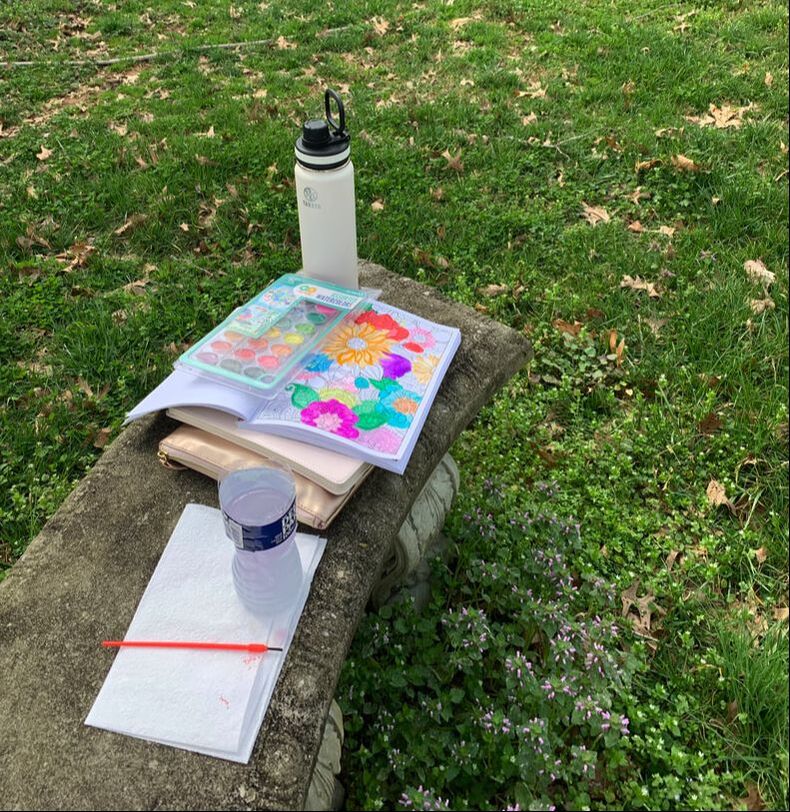 I just returned from a three-day personal retreat. Why on earth would I go away by myself for even more solitude when we’ve been isolated for so long in the pandemic? Because the noise, distractions, and challenges of daily life can dull our spiritual ears and hearts—even if we live alone or in relative quiet with just one other person, as I do. Add in some delayed grief and another recent loss, and I knew I was overdue. I longed to hear God’s voice within more clearly and reconnect with my spiritual heart, discovering my God-given desires in this season. This time away brought rest, release, and renewal as I surrendered to the invitation to simply “be” and enjoy things that bring me joy. For me, that included things like taking walks, journaling, meditating on scripture, practicing yoga, coloring, painting, playing my flute (I realized how much I have missed that), savoring fresh juice, observing the beauty of spring, going barefoot, and simply sitting and listening to a thunderstorm. Besides talking with God in my usual ways, I allowed all of these activities to become prayer—moments of enjoying God’s company as we just hung out together. Despite some popular misconceptions, God is a really fun companion! And that’s good news, because God’s Spirit, who dwells within us, actually is our constant companion. Despite some popular misconceptions, God is a really fun companion! Throughout my three days of solitude, I sensed the invitation to simply receive and rest in God’s great love--for me. It was a beautiful time of allowing God to love me and allowing myself to love me, too. At times my inner critic and task manager whispered that something I was doing was “wasting time” or nonproductive. And I just gently responded that being with God and enjoying each other’s company is never a waste of time; it actually redeems time by restoring what so much of our “productive time” has stolen from us. God knew that this simple yet profoundly meaningful “resting and receiving” is just what my soul needed right now. Being with God and enjoying each other’s company is never a waste of time; it actually redeems time by restoring what so much of our “productive time” has stolen from us. Though I did receive some clarity about my heart’s desires, I realized with great clarity that my deepest desire is simply to be filled with love—to remain in what Ignatian spirituality (which, by the way, is incredibly practical spirituality) calls the “love loop”: God loving us (in a million different ways each day), and us loving God and others in response. Becoming more and more aware of this love loop each and every day is what helps us to remain in it—and then to get back in the loop when we fall out of it, as we all do (quite regularly, in fact). When we’re attentive to how continually and overwhelmingly God loves us, just as we are, nothing is more natural than to love in response. Take in these beautiful words of Pedro Arrupe: What you are in love with, what seizes your imagination, will affect everything. It will decide what will get you out of bed in the morning, what you will do with your evenings, how you will spend your weekends, what you read, who you know, what breaks your heart, and what amazes you with joy and gratitude. Fall in love, stay in love, and it will decide everything.* I encourage you to take time for solitude and silence, even if all you can think about right now is being with others and returning to some sense of normalcy. I long for that too. But unlike the solitude of the pandemic, the gift of intentional solitude—chosen for the purpose of connecting more deeply with ourselves and with God—refreshes our souls and spirits unlike anything else. And that's something we all need in this season. “Knowing how to be solitary is central to the art of loving. When we can be alone, we can be with others without using them as a means of escape.” —Anonymous “Being solitary is being alone well: being alone luxuriously immersed in doings of your own choice, aware of the fullness of your own presence rather than of the absence of others.” —Alice Koller “There is a difference between loneliness and solitude, one will empty you, and one will fill you. You have the power to choose.” —Anonymous *https://www.ignatianspirituality.com/what-are-you-in-love-with/
I’m writing this on Ash Wednesday, the beginning of the season of Lent, which is the period of forty days preceding Easter. Traditionally, it is a season for reflection and repentance—turning toward God and away from whatever separates us from God—as we prepare ourselves for the celebration of Easter. The forty days of Lent represent the forty days that Jesus spent in the wilderness, enduring temptation and suffering before he began his ministry. It’s an opportunity to identify with Christ and deepen our relationship with God. A common practice during this season is to fast or give up something so that we become more aware of our reliance on God and both increase and intensify our time in prayer. In the past I’ve given up certain foods, social media, and unhelpful practices such as complaining—some with more “success” than others—though it’s really not about “success” at all but about the practice of focusing our minds on God. Yet, if we’re really honest, there are times when our self-denial may be less about deepening our relationship with God and more about losing weight, becoming healthier, or bettering ourselves in some way. Or we might tell ourselves that any self-improvement resulting from our self-denial is merely a nice “bonus.” I’ll admit I've told myself that before—just keeping it real. If we're really honest, there are times when our self-denial may be less about deepening our relationship with God and more about . . . bettering ourselves in some way. Like many others, I’ve found that giving up something for Lent is not always the best way for me to draw closer to God. Sometimes taking on something—such as adding or recommitting to a spiritual practice or being intentional in the ways I love and serve others—helps me to experience God more fully. Just as God speaks to us in different ways, we can be drawn to different practices at different times, especially if we’re in a season of hardship or loss. The last two years have brought some significant losses in my life—the loss of my mother-in-law to Alzheimer’s, my father to Parkinson’s, several family friends to Covid and other illnesses, both of our longtime pets to advanced age, and another loss I will share more about at another time. Though your losses may be very different than mine, the truth is that the last year has brought loss and difficulty to all of us. This continues to be an ongoing wilderness season, adding the weight of communal loss to what we are carrying personally. So, this Lent I’m sensing an invitation to journey through the season with gentleness and grace, giving myself permission to do the things that draw me nearer to God and help me to experience and rest in God’s extravagant love—which, after all, is the reason God sent Jesus in the first place (John 3:16). God’s message always has been and always will be, “You are so loved!” That’s a message I need every day, and I suspect you do too. This Lent I’m sensing an invitation to journey through the season with gentleness and grace, giving myself permission to do the things that draw me nearer to God and help me to experience and rest in God’s extravagant love. For the next forty days, I’m letting go of rigidity and choosing simply to “hang out” with God each day in whatever way I feel drawn. Some days I may spend time in Centering Prayer, which is sitting quietly with God without words. (If that appeals to you, see below.) Other days I may choose to journal, capturing my conversation with God on paper. (If that interests you, also see below.) Some days I may choose to spend time in imaginative prayer, entering the Scripture scene through the God-given gift of my imagination—one of the most experiential and powerful ways we can pray. No doubt there will be days when I simply take a walk or spend time on my yoga mat, meditating on God and God’s Word as I move my body. Whatever I do, I will allow the Spirit to lead me, asking myself questions such as these: What will give me life today? What will deepen my connection with God/Christ today? What will increase my sense of faith/hope/love today? What will give me joy in the Lord today? Giving up something may be just what you need to draw you closer to God this Lent. If so, I encourage you to allow your self-denial to be a way of walking gently toward Easter, remembering that the objective is not to be “successful” but simply to focus on your relationship with God. Or perhaps, like me, you may decide that what will bring more spiritual growth in this season is to add rather than subtract something from your life. Maybe you will choose a combination of the two. Whatever you decide, I encourage you to discern what will deepen the life and love of God in you Lent is not a one-size-fits-all season, and it’s okay for your practices to look different from those of others. Lent is not a one-size-fits-all season, and it’s okay for your practices to look different from those of others. Listen to your deepest, truest self—the part of you where the Spirit of God dwells—and allow God’s Spirit in you to reveal what will be most nourishing to your spiritual heart right now. Then choose to do that, trusting that your journey will bring you closer to the heart of God! Upcoming opportunities... 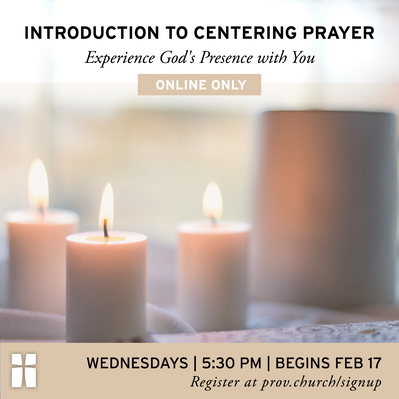 Join us each Wednesday during Lent for 30 minutes of Centering Prayer and learn to rest in God's love as we sit in silence with no other agenda except letting go and trusting him. Click here to register. 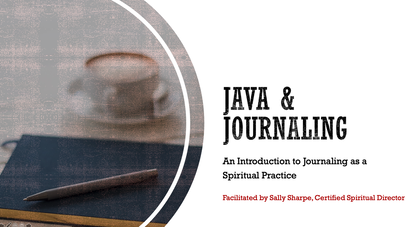 Join us on Saturday, March 6 from 9:00 am - 12:00 pm CST for this introduction to journaling as a spiritual practice. Click here to register. It’s the start of a new year, and everywhere I look I see suggestions for how to make improvements in my life, from physical fitness to organization to spiritual growth. I’m all for ongoing growth, especially spiritual growth; but so often we approach our spiritual formation as a to-do list, thinking that if we just read the Bible more, pray more, or serve more, then we will reap spiritual growth (become more like Christ). The emphasis in this mindset is on self-effort and striving, which lead to shame. These three life-taking S’s keep us trapped in a cycle of performance:
Actually, the path to spiritual growth is one of releasing, not doing. It’s a process of letting go of self-effort, striving, and shame so that we can allow God to transform us, making us who we are meant to be. Contemplative practices facilitate this process, enabling us to quiet our minds and connect deeply with God so that “God, who began the good work within [us], will continue his work until it is finally finished….” (Philippians 1:6 NLT). Our part in this process is letting go through three life-giving S’s that lead to transformation:
The path to spiritual growth is one of releasing, not doing. There was a time when I resisted these three S’s. As a 2 on the Enneagram (which is one way of looking at personality types), I desire connection, which generally involves being with people and communicating. So, silence and solitude were not initially appealing to me. Similarly, my 3 wing likes to be valued for being productive, something that our culture not only encourages but actually demands of us—and something that is not possible in stillness. But as I have learned to embrace silence, solitude, and stillness, I have discovered that these contemplative practices actually deliver so much more than the motivations of my ego ever could. The same is true for you, whatever your Enneagram number or interior motivation might be. Silence, solitude, and stillness slow us down, allowing us to let go of mental clutter, connect deeply with God, and rest in God's healing presence and love. And that is what transforms us. If you're still not convinced, I get it. Few of us are inclined to enthusiastically embrace silence, solitude, or stillness—at least not in the beginning. From the time we rise in the morning to the time we go to sleep at night, we’re continually stimulated by a variety of screens and other "inputs" that keep our minds engaged and our hearts distracted. There is much within us that resists slowing down and quieting the noise. Quiet allows our fears, worries, regrets, disappointments, doubts, and resentments to surface—and who wants that, right? But here's the liberating truth: making space for these things to surface gives us the opportunity to practice noticing them and then letting them go as we acknowledge we are not in control and invite God to work within us. Silence, solitude, and stillness open us to this transformative work. Centering prayer is a good way to begin practicing these postures that invite God’s deep work within. (See below for the guidelines and benefits of centering prayer.) In this practice of praying without words, God is accomplishing something we could never do for ourselves, something too deep for words. When I think of centering prayer, I think of Romans 8:26-27, which tells us that when we do not know what to pray, the Spirit intercedes for us with “wordless groans” (NIV), searching our hearts. I love how The Message Bible expresses it: “If we don’t know how or what to pray, it doesn’t matter. He does our praying in and for us, making prayer out of our wordless sighs, our aching groans. He knows us far better than we know ourselves, knows our pregnant condition, and keeps us present before God.” We might say that centering prayer is the practice of completely trusting the Spirit of God to pray and work in us. Our part is simply to show up and "practice" letting go, noticing and releasing thoughts and emotions as they arise and then returning to resting in God. And, as with anything we “practice,” the fruit of our practice comes over time. The key is to stick with it and trust that, slowly but surely, noticeable changes will become evident—both within us and within our lives. Centering prayer is the practice of completely trusting the Spirit of God to pray and work in us. I admit that when I first started practicing centering prayer, it seemed that nothing was happening, and I was impatient with the process. But in time, I began to notice in my daily experience some of the benefits I had read about, such as being more present to God and others, more responsive (rather than reactive), and more at peace. Once I had this realization, I was hooked! Though purists suggest spending twenty minutes in prayer once or twice daily, I've found that to be unrealistic with my schedule. So, believing that something is better than nothing and that flexibility and customization are not only acceptable but also desirable when it comes to spiritual practices (after all, God works with each of us uniquely), I gave myself permission to develop a centering prayer practice that works for me. Though the duration of my silence varies, I notice benefits as long as I consistently make space for the practice. During the past couple of years, which brought several significant losses, practicing silence, solitude, and stillness has been instrumental in helping me to "let go" and surrender to God’s work within me. This practice helped me through 2020, and I'm counting on it to see me through 2021. In fact, I have decided to make even more space in my life this year for this transformational practice. Phileena Heuertz says that "To the extent we are transformed, the world is transformed,"* and I agree that our our own transformation is necessary for the transformation of the world around us. Our own transformation is necessary for the transformation of the world around us. If you would like to join me in inviting God to do a deep work in you as you slow down and make space for more silence, solitude, and stillness this year, centering prayer is an excellent way to get started. For many people, sitting in silence with others can be more comfortable than doing it alone. Though a mystery, it's possible to experience solitude and community simultaneously. In fact, joining others in silence actually unites us as we rest in God’s love together. During the season of Lent (the forty days preceding Easter), my friend and fellow spiritual director Scott Spradley and I will be offering an online centering prayer group designed as an introduction to the practice. We will meet on Zoom each Wednesday during the Lenten season. All are welcome, and we’d love to have you join us (see below for more info). Or if you’d like to try centering prayer on your own, I encourage you to download the centering prayer app from Contemplative Outreach (also see below), which allows you to select the duration of your silence and offers a variety of beginning/ending sounds and a selection of opening/closing prayers. Of course, centering prayer is not the only way to slow down and connect more deeply with God. Observing regular Sabbath rest, meditating on Scripture (such as lectio divina), journaling, observing nature, taking walks or hikes, and practicing breath prayer are just a few examples of other contemplative practices. Choose one or two practices that appeal to you and commit to stick with them for several months, trusting that God is doing what you cannot do for yourself even if you do not yet see evidence of it. Be patient and remember that change comes over time. Whatever you choose, my prayer is that this year you will let go of striving and invite the deep work of God within you. 3 GUIDELINES OF CENTERING PRAYER
BENEFITS OF CENTERING PRAYER
CENTERING PRAYER APP YOU'RE INVITED! What: Introduction to Centering Prayer (Online Group) When: Every Wednesday, February 17th - March 31, 2021, 5:30 - 6:00 p.m. Where: Zoom Sign Up Here: www.prov.church/sign-up (coming soon; or contact me at www.sallysharpe.net) *Quoted in The Sacred Enneagram, Christopher L. Heuertz (Grand Rapids, MI: 2017), 172.
Years ago, when my girls were around the ages of five and eight, I had a myelogram to determine the cause of ongoing back pain. After the procedure, I developed a spinal fluid leak that caused a spinal headache, which is a debilitating headache that worsens when sitting or standing and improves when lying down. After being upright for just a little while, I would have to lie down again because the pain was so severe. It felt like my head was literally going to explode. Hands down it was the worst pain I’ve ever experienced in my life. After spending a couple of weeks flat on my back, it was recommended that I have a blood patch in an attempt to block the leak; but the procedure seemed to create even more of an opening, and I wound up worse than before. I remember lying flat on the couch on Christmas morning as the girls opened their presents, bringing them over to me one at a time for me to see what Santa had brought. Then their grandparents took them to eat Christmas brunch and visit with extended family while Neil stayed with me, watching one Christmas movie after another as we lay in the bed. (And that was quite a sacrifice because several of them were on the Lifetime channel!) Months went by, and I was able to be up for one and then two and then three hours at a time before having to lie down again. But I had to plan my activity strategically and be prepared to lie down again when the debilitating pain returned, which caused a great deal of anxiety. I didn’t know if I would ever recover and be “normal” again. Not being able to care for my family and seeing the toll it was taking on Neil was as bad as the physical pain itself. During this time, I struggled to hope. I memorized and meditated on Romans 12:12 continuously: “Be joyful in hope, patient in affliction, faithful in prayer.” Though I was managing the last two as best I could, I simply could not be joyful in hope. Hope seemed like empty, wishful thinking to me. Hope seemed like empty, wishful thinking to me. One day Neil came home with a gift—an angel holding a banner that says “Hope.” He knew I was struggling and thought that this visual reminder might help me to set my mind on hope and, in time, allow it to take hold of my heart as well. I remember staring at that angel each day, asking God to give me hope while feeling mostly anxiety, fear, and deep sadness. Six months later I was still struggling physically and emotionally, but we made plans to go out for dinner to celebrate our anniversary. I rested all day so that I might be able to be upright for several hours. We chose a new restaurant and arranged for a babysitter for the girls. It felt so good to be out doing something so “normal”—something I realized I had taken for granted, like so many other things. It was a very nice evening—until about halfway through the meal. The familiar tightness and throbbing pain began in my lower neck and slowly made its way up the back of my head, increasing in intensity as it progressed. Tears began to stream down my face as I told Neil another headache had begun and we would have to leave. He knew my greatest fear was that I would never get better, but he didn’t know that the underlying fear was that the strain of it all eventually would tear us apart. So I was overcome when he looked me in the eyes and said, “If you never get better, I will always be here. I’m not going anywhere. I love you.” Although the pain continued to increase that evening, I sensed that something significant was happening within me. You see, from that moment on, I knew that whatever happened, we would face it together. I was loved, and I wasn’t alone. Though I had known this before, I needed the reassurance. Neil’s declaration of love and faithfulness assuaged my fear and gave me hope. In the coming weeks, I began to realize that Neil’s words were much more than a personal declaration. They also were God's loving message to me, communicated through Neil: “I love you, and I am with you. I will never leave you or forsake you.” God used someone with skin on to communicate a message I desperately needed to hear. Now when I starred at the angel with the banner of hope, I realized that hope is not tied to external circumstances but to internal assurances. Hope flows from knowing that whatever might happen, we are loved and never alone. The greatest hope of all is found in God’s faithful love and presence. I realized that hope is not tied to external circumstances but to internal assurances. Hope flows from knowing that whatever might happen, we are loved and never alone. As that hope began to take hold of me, my physical healing slowly accelerated. Within two months—praise God—I was pain free. Of course, physical healing is not a guaranteed outcome of hope or faith. And every relationship does not survive difficult circumstances. Those are not the points I am making. What I want to remind us of, to reassure us of, is that regardless of our circumstances—when the suffering continues, the relationship ends, the outcome looks bleak—our loving, faithful God promises to walk through it with us. We are never alone, and we are always loved—even when we despair and lose all hope. God comes to be with us in our pain and, in time, to restore our hope. And God often sends messengers with skin on to help us know and remember God's faithful love for us. In fact, that is why God came to earth as Emmanuel, which means “God with us”—so that we might know God understands our plight, loves us completely, and enters into our suffering with us. God not only enters our suffering but also redeems it. I believe this is something we all need to be reassured of this Christmas in particular. Whatever 2020 has brought for you and yours, whatever you have suffered, whatever pain you are now carrying, whatever hopes have been crushed or lost—remember this: you are dearly loved, and you are never alone. Emmanuel knows your circumstances and promises to be with you through them. God can even redeem your suffering. Hold onto that hope. I pray it will take hold of you and bring whatever healing you need this season. May you recognize God’s loving and faithful presence, and may it fill you with the gift of hope! “The virgin will conceive and give birth to a son, and they will call him Immanuel” (which means “God with us”). (Matthew 1:23 NIV)
Be joyful in hope, patient in affliction, faithful in prayer. (Romans 12:12 NIV) May the God of hope fill you with all joy and peace as you trust in him, so that you may overflow with hope by the power of the Holy Spirit. (Romans 15:13 NIV) This has been one of the most beautiful falls we’ve had in several years—and we’ve certainly needed it, haven’t we? The leaves have been spectacular, displaying their vivid colors against the bright blue autumn sky. One reason it has been especially beautiful to me is that the red-leafed maple trees have seemed more prevalent this year, accenting the mix of yellow- and orange-leafed trees that are more common here in Middle Tennessee. Perhaps there aren’t actually more maple trees than last year, but it’s just their year to show off. And they’re certainly doing a good job of that! In any case, I have truly enjoyed the diversity of colors. Diversity makes the world more interesting and beautiful. That’s the appeal of travel—visiting places where the scenery is unique, filling us with awe and wonder in our amazing God. We were made to appreciate, even long for, the creativity and beauty of our diverse world. Here’s a question I’ve been pondering this fall as I’ve enjoyed the colorful trees in the midst of so much discord all around us: Why do we so easily embrace the diversity we see in the natural world yet often struggle to embrace the diversity we see in other people? This year, with all that has been going on in our nation and our world, “difference” has seemed to cause more distrust than appreciation, more division than celebration. And it has taken its toll on us—even among family members and friends. All of the arguing and name calling we’ve witnessed—and perhaps participated in at times—has caused many to draw sharp dividing lines, relegating people to camps or “boxes.” Yet the truth is that despite our differences and disagreements, we all are beautiful creations of our amazing God. Regardless of our views on COVID or masks or the election or race relations or any other issue we could name, we all are dearly loved by the creative God who made us. Despite our differences and disagreements, we all are beautiful creations of our amazing God. God doesn’t love us “if”—if we look or think or act a certain way. God simply loves us. We do nothing to earn God’s love. It is freely extended to us without condition. That is why God’s Son came to earth, so that we could know the extent of God’s love—"how wide, how long, how high, and how deep" it is (Ephesians 3:18 NLT). It is a love that rescues, liberates, and transforms—and it is meant for all. God’s unconditional love doesn’t excuse or overlook hurtful behavior, and there are consequences to our actions; but God never gives up on us. And that’s good news! Regardless of our differences, we have this in common: God never stops pursuing us and inviting us to be transformed and healed by God's love so that we can love each other with that same astonishing love. Soon we will be gathering around our tables to give thanks. Though our numbers may be smaller this year and some of us may be joining loved ones via Zoom or FaceTime, we still will have the opportunity to bear witness to the beautiful diversity and creativity of God on display within our very own families and friends. So, here’s my Thanksgiving proposition. As we cook and eat and talk together, let’s redeem 2020 by making space for one another to be seen, known, and loved. Let’s allow each other to be who we are, extending an invitation to freely share our hurts and hopes with one another (if it feels safe to do so). Let’s listen to each other’s thoughts and viewpoints—truly listen—without judgment or ridicule, remembering that our differences do not have to separate us but actually can be like good seasoning, adding variety and spice to our lives. Just think how bland Thanksgiving dinner would be without sage, thyme, rosemary, or pumpkin spice! In the same way, our lives would be dull and boring without the differences of others—even the ones we may find irritating at times. Our differences do not have to separate us but actually can be like good seasoning, adding variety and spice to our lives. That child or teenager who is pushing our buttons? What if we took a breath and remembered that we were their age once too, giving them room to grow and discover who they are? That spouse or roommate who is getting under our skin because we’ve been cooped up together for nine months? Just think how much we would miss them—and their idiosyncrasies—if they weren’t a part of our lives anymore. That relative or friend who has different political or religious views and can be opinionated? Perhaps it will help to remember that “us” versus “them” constructs are rooted in fear (the fear of what we don’t know, don’t understand, or can’t control), and reacting defensively only closes us off, creating more barriers. But listening without defensiveness opens us to understanding, empathy, and connection (none of which, by the way, requires agreement or assent). Here's an important caveat. If you have been abused (whether verbally or physically), deeply hurt, or repeatedly disrespected by someone, setting boundaries is necessary and important for your own well-being. Depending on the situation, that might mean not having contact for a period of time or even deciding that it’s not healthy for that person to be a part of your life. (Meeting with a counselor, pastor, or spiritual director can be helpful as you discern appropriate boundaries.) If you do spend time with an unsafe person who begins to speak or act disrespectfully or cause harm in any way, it’s always appropriate to set a boundary. Sometimes loving others with the love of Christ means saying, “It’s not OK for you to speak to me/treat me that way” and removing yourself from the situation or asking the other person to leave. Embracing differences does not mean allowing others to do harm to yourself or others. Embracing differences does not mean allowing others to do harm to yourself or others. My prayer for all of us this Thanksgiving, whether we gather in person or connect virtually with loved ones, is that we will keep our focus on the people we love, not the things that threaten to divide us. Let’s be thankful for the unique individuals God has made us to be and look for the things we can affirm in each other—even if it’s only that we recognize the other person’s individuality and passion. Then, as we begin to embrace the diversity of the people in our homes or on our screens, let’s invite God to continue healing and stretching our hearts so that we can appreciate and embrace even more people who are different from us. Whether they live across the street, across town, across the country, or across the globe, may we ask God to enable us to love them with the astonishing, inclusive love of Christ. 16 And I pray that [God] would unveil within you the unlimited riches of his glory and favor until supernatural strength floods your innermost being with his divine might and explosive power.
17 Then, by constantly using your faith, the life of Christ will be released deep inside you, and the resting place of his love will become the very source and root of your life. 18–19 Then you will be empowered to discover what every holy one experiences—the great magnitude of the astonishing love of Christ in all its dimensions. How deeply intimate and far-reaching is his love! How enduring and inclusive it is! Endless love beyond measurement that transcends our understanding—this extravagant love pours into you until you are filled to overflowing with the fullness of God! (Ephesians 3:16-19 The Passion Translation) The Big three of spiritual discernment Call me strange, but I actually like organizing my closet and transitioning from spring/summer clothes to fall/winter clothes, storing the off-season clothing in storage bags on a top shelf. I play music loudly (as I sing along) and take time weeding out items I haven’t worn in the last year. As I was putting away my summer dresses, I realized I did not wear a single one of them this year. Not one. It wasn’t because I didn’t want to; there simply had been nowhere for me to wear them. Suddenly, a wave of disappointment washed over me. Now, I’m happy in shorts and jeans, which is what I lived in this summer, so it wasn’t the fact that I hadn’t worn the dresses that was causing my disappointment. It was what they represented—all of the social gatherings, worship experiences, special occasions (including a vacation with friends, which I had bought a new sundress for), and professional interactions and events that hadn't happened. The dresses reminded me of all the in-person connections I’ve missed—and dearly. As I acknowledged the sadness I was feeling, tears began to form in my eyes. I knew it was time for “the big three.” This is the process at the heart of spiritual discernment that has been saving my life during this year of disappointments and challenges: The Big Three Awareness Understanding Response In a nutshell, the process of discernment helps us to live with our spiritual eyes open so we can become aware of, understand, and respond appropriately to what is happening within us. Discernment helps us to connect with God, listen, and choose what will lead to God’s deepening love and life in us. As we’re going about our everyday lives—working, cooking, eating, exercising, doing chores, having a conversation, or cleaning out a closet—we simply become aware, understand, and respond. The process of discernment helps us to live with our spiritual eyes open so we can become aware of, understand, and respond appropriately to what is happening within us. Here are a few helps for each step of the process: 1. Awareness. The first step is simply to notice what we are feeling and thinking. We might think of it as becoming aware of our interior experience with “open eyes.” In other words, we listen to our hearts and notice our thoughts. We become self-aware by taking time to slow down, notice, and listen to ourselves. Ask yourself: What is happening within me? 2. Understanding. The second step is thinking about the feelings and thoughts we have named and considering where they are leading us. Every thought and feeling either moves us toward God or away from God; either fosters connection with God or disconnection with God; either increases love or diminishes love. Ask yourself: Is this thought/feeling leading me toward God or away from God? Is it increasing or decreasing my sense of connection with God? Is it helping me to love God, others, and myself? What does God want me to understand about it? 3. Response. The final step is choosing to take action with spiritual wisdom. This involves prayerfully determining what will enable us to love God, others, and self (Matthew 22:37-39) and deepen the life of God within us. We consider what will bring benefit and not harm, choosing what helps and letting go of what does not. We intentionally respond in a way that will move us toward God and increase our experience of God's love. Ask yourself: What will move me toward God rather than away from God? What will help me to love God, others, and myself? What will bring benefit rather than harm to myself and others? The outcome of the discernment process is being able to choose what will lead us to a deepening experience of God and God’s love, which leads to healing and wholehearted living. It is built upon the foundation that God is love, God wants to be in relationship with us, and God is constantly communicating with us and showing us more of who God is and what God desires for us. The outcome of the discernment process is being able to choose what will lead us to a deepening experience of God and God’s love. As I stood in my closet, I became aware that I was incredibly sad—not only because of the loss of certain events and experiences, but also because of the missed connections with others. Feeling connected with others is both a basic need and a unique passion that God has given me. I feel most alive—knowing I’m living from my true self—when I connect deeply with others, heart to heart. As I named my sadness and the loss behind it, I had “open eyes” to notice an even deeper sadness related to a couple of other disappointments or losses, and I allowed myself to acknowledge, name, and feel each of those hurts as well. (Often the sadness we feel in a particular moment is connected with other hurts causing the same emotion. For deeper discernment, we can ask God to help us remember when we’ve felt that same emotion in the past, seeing what comes up.) Next I asked God to show me what I needed to understand about these disappointments—where they were leading me. I realized that one hurt was moving me toward self-pity, and another was opening the door to resentment. Rather than feeling any guilt or condemnation for those admissions, I felt only the warmth of God’s compassion for me in that moment of authenticity with the One who knows me best and loves me most. The question now was how would I respond? What would help me let go of what was harmful and embrace what would be beneficial? After some reflection, I sensed God inviting me to radically accept that all of God’s gifts are temporary, yet the love behind and within them continues. God uses all things, every gift, to grow us in love. This means that even our disappointments and losses can become gifts of love if we allow God to use them to deepen our life in God. Though this doesn’t eliminate the pain of the loss, it does lead to acceptance, healing, and wisdom (which usually is a process). Now sitting on the floor, I knew the action I needed to take was to remember and celebrate the gifts of love that I’ve been given through the people and things and experiences I was grieving. I chose to give thanks and to remind myself of particular moments and specific gifts of love I had received. It was a healing experience in an ordinary moment surrounded by shoes and hangers and dresses. Earlier I had considered whether or not to bother getting out my fall and winter dresses. Would I even wear them this season? Suddenly, with a burst of energy and a smile on my face, I knew what I wanted to do: hang up every dress with hope and expectation. Even if I don’t have the opportunity to wear them, they will remind me that God has given me the gift of passion for connecting with others; and although the expression of that passion may look different in this season, it will continue to grow me in the love of God. What are you missing this year? What disappointments or losses are causing you sadness, hurt, anger, or some other emotion? I encourage you to give “the big three” a try. It can be a quick process that takes only a few minutes, or it can be a longer period of reflection if you have the time. If desired, journaling can be a helpful aid in the process as you write your responses to the questions above and listen for God’s replies. Give yourself permission to go slowly and learn gradually. (You also might find the guidance of a spiritual director to be helpful.) Most of all, know that whatever arises as you pay attention to your inner experience, God looks upon you with great love. God’s desire is always to lead you into a deepening connection and experience of divine love—a love that heals and never fails. I don’t have much of a green thumb. I never have. I do best with plants like philodendrons, peace lilies, and aloe plants. So, when my friend gave me an aloe plant on my birthday a year ago, I thought, Great! I should be able to keep this alive! I put it in just the right spot so that it would get some sun—but not too much—and I watered it about once every week or two as suggested. It did great for a long time, and then I began to notice that it seemed to be struggling. I tried watering it more often, but that didn’t help. Next, I trimmed back some of the places on its leaves where it was drying up and turning brown, but that did nothing except make it look even sadder. Then one day my daughter Brenna said matter-of-factly, “You need to transplant your aloe plant to a bigger pot.” (Both of my daughters have incredibly green thumbs, by the way.) The truth is, I had briefly considered that, but I didn’t want to do it because, well, I liked the pot the plant was in. I thought it was cute and clever, having the phrase “Aloe-ha” written across the front. Whenever it caught my eye, it made me smile, and it also reminded me of the friend who had given it to me. So, I decided to keep the aloe plant in the cute pot, and it continued to dry up. But now, every time I saw the plant, I heard these words in my mind: just replant it. Before long, I realized that I was thinking about it differently. Instead of focusing on the fact that the pot is cute and clever, I began to focus on the reality that my plant needed a larger pot so that its roots could grow. As much as I liked it, the pot it was in was no longer the right environment for the plant to grow and thrive. So, I found an empty pot I already had and repotted my plant—a temporary move, I told myself, until I can find another cute pot for it. To my amazement, within just a few days the leaves went from thin and brown to thick and green; and within two weeks it had nearly doubled in size! That’s when I began to hear God speaking gently and lovingly to my heart: You know, you’re not so different than this aloe plant…. It’s true. How often have I resisted a needed change in my life because I didn’t want to let go of something? I thought of numerous times when, whether it was because of familiarity or my own short-sighted preference, I just couldn’t imagine giving up whatever I thought I needed in order to make a change—one that ultimately would bring a much greater benefit. And so, I resisted. Can you relate? When it comes to our well-being—the heath of our bodies, minds, and souls—sometimes change is what we desperately need. In fact, sometimes the only way for us to thrive is to “replant ourselves,” moving out of the old environment into a new one that gives us the room we need to grow. For some of us, that might mean considering a literal change in our environment, such as moving, changing jobs, or taking a vacation, retreat, or sabbatical. A change in our physical surroundings or daily schedules and routines can play a major role in helping us to “reset” and find the space and soul nourishment we so desperately need. For others of us, a new environment might simply mean changing our habits, attitudes, or responses—such as the practices that help us find comfort and peace, the mental tapes we listen to on repeat, or the choices we make in response to our feelings. Sometimes the only way for us to thrive is to "replant ourselves"... This pandemic and all of the turmoil we’re experiencing this year has been hard, and many of us are struggling. Like my aloe plant, perhaps what we need is to replant ourselves. Often it’s during the dry, difficult seasons when we become aware that change is needed—that the old is no longer working for us and we need to be open to embracing something new. Here’s an important caveat: making a major life change during a time of grief or crisis is not recommended—unless, of course, it cannot be avoided. However, it’s always advisable to listen for and be open to God’s invitations, which lead us gently toward the changes that are needed in each season. (A spiritual director can be a helpful companion in that discernment process.) So, what changes is God inviting you to embrace at this time? Are you willing to stretch beyond what is familiar in order to try something new that promises renewed life and growth? What kind of “replanting” might help you to find the nourishment you need for your body, mind, and soul? It’s my hope that you will join me in reflecting on these questions and listening attentively for how God is leading in this season. One thing we can be sure of: replanting always leads to health and growth! They're like trees replanted in Eden, putting down roots near the rivers — Never a worry through the hottest of summers, never dropping a leaf, Serene and calm through droughts, bearing fresh fruit every season. (Jeremiah 17:8, The Message) Life tends to pull us off center. Often trials and losses are the culprits—things such as natural disasters, pandemics, economic struggles, social and political unrest, relational conflict, and hurts and disappointments. Sounds familiar, right? We’ve really been through it this year! No wonder we’re feeling off center. So, how do we find our center and restore our peace? This is what the spiritual journey is about—“coming home” to our center, which is Christ in us, and resting there. It’s a process, not a formula or quick fix; and a spiritual director can serve as a guide along the journey. But I’d like to share just a few insights and an exercise that have been helpful to me and, I hope, will be helpful to you. First, let’s consider what “coming home” or being centered looks like. It’s always helpful to identify health so we know where we are headed.
I used the word “growing” each time intentionally, because it’s important to realize this is a messy process and the goal is not perfection but progress. Sometimes we will be centered in one area but off center in another. And the good news is that God patiently and lovingly calls us home in each area, gently guiding us and showering us with grace. Second, we can find some clues for how to move toward this place of centeredness and peace in Psalm 131, which speaks of quieting ourselves like a child in its mother’s arms. That sounds wonderful, doesn’t it? But how do we do it? If we read between the lines, we can identify four “exchanges” happening in these three short verses: Letting go of ego or pride and embracing humility (v. 1). Letting go of the need for certainty and embracing mystery (v. 1). Letting go of anxious striving or craving and embracing rest (v. 2). Letting go of doubt or fear and embracing hope (v. 3). How do these exchanges happen? We can let go of pride by giving up our need to be seen, recognized, praised, or acknowledged as right—choosing, instead, to serve and honor others above ourselves. We can let go of the need for certainty by relinquishing our right to understand what doesn’t make sense and recognizing that much about life and God is a matter of the heart, not the mind. We can let go of striving or craving by trusting that God will meet all of our needs, which gives us rest. And we can let go of doubt or fear by believing that God is with us and for us, working all things for our good, which gives us hope. When we find ourselves off center, we can review these four exchanges and talk with God about what we need to release and receive. If any of these exchanges is difficult for us, we can ask, “What obstacle is in the way, Lord?” Most likely it is a past wound that has caused a false belief to become our truth. Whether now or later, God will reveal these obstacles to us at the right time and lead us on the path to healing. In the meantime, and perhaps as part of the process, here is an exercise to help us quiet ourselves in God: Quiet Yourself in God
Keep in mind that this is not a once-and-done exercise but an as-often-as-you-need it process. When you find yourself off center in more than one area (God, self, others, things) or dealing with anxiety you may not be able to explain, make this a regular practice (perhaps daily or even several times a day). It is my hope that as you do this, your love for God will deepen, your trust in God will grow, and the fruit of a quiet heart will bloom in your life—love, joy, peace, patience kindness, goodness, faithfulness, gentleness, and self-control (Galatians 5:22-23). For More:
Weary. Worn Out. Done. Spent. These are a few words I’ve heard others use recently to describe how they are doing. I've been there myself. Can you relate? We’ve been through so much in just a few short months, and the ongoing challenges, uncertainty, stress, and strife are taking a toll. Though we have our own struggles and concerns, we’re all essentially walking through a wilderness season together. Perhaps one of the reasons we’re seeing so much conflict and discord right now is that many are weary from the journey and desperately in need of refreshment and renewal. It’s hard to offer love, understanding, and kindness when we’re worn out and running on empty. I once had a green plastic watering can I used to water my flowers on the deck and front porch. One day I noticed that it was leaking water through a small hole in the bottom. It was just a little drip at first. But over time the hole became larger, which allowed more water to leak out. That meant I had to fill up the can more often in order to be able to water all of the flowers. A similar thing happens with us. We need continual filling and replenishment because we’re “leaky vessels,” especially in challenging seasons when the “holes” become larger and we’re drained more quickly. But unlike my watering can, we don’t have to look to external sources for our filling. In fact, they can never fill us. Our filling comes from the Spirit of God, who is not only beyond us but also within us. "We renew our souls and spirits by connecting and communing with the God of the universe, who dwells within us." We renew our souls and spirits by connecting and communing with the God of the universe, who dwells within us (John 14:23, 1 Corinthians 3:16, Colossians 1:27). What an amazing and incredible mystery! This is such great news, because it means that God is always as close as our very breath. In times when God seems distant, the problem is not that God is far away but that we’re not connected or attuned to God’s presence. Though many of us believe that God is always with us, we don't always experience the reality of God's presence—because experiencing God’s presence is a matter of awareness. "Experiencing God’s presence is a matter of awareness." Spiritual practices such as prayer, meditation, Scripture reading and study, worship, silence, service, and others are tools or vehicles that help us to become aware of God’s presence. But unlike these practices that we might do for a certain amount of time at some point during the day, the practice of awareness itself is something we can do throughout the day to stay connected with God and be renewed by his presence. Brother Lawrence called this practicing the presence of God. How do we do it? We start by simply paying attention to what’s happening both inside us (our thoughts, feelings, and sensations) and around us (our experiences and observations). Nothing is too insignificant to notice, including the little gifts that come to us each day—such as a beautiful sky, an encouraging word from a friend, a moving song, a loving embrace, or a million other little things. As we’re paying attention to these things, we do so with an awareness that God is both present with us and ready to communicate with us. That’s it. It’s not complicated, and it can become as natural as breathing. The idea is to see everything as an opportunity for experiencing God, "in [whom] we live and move and have our being” (Acts 17:28 NIV). As we practice the presence of God, we can carry on an internal dialogue with God about our thoughts, feelings, experiences, and observations. Here are some questions we can ask God in any moment: How are you present right now? What do you have to say to me about this, or through this? What does this reveal about your presence or activity? Is this leading me closer to you or away from you? What is your invitation to me in this moment? This kind of conversation is a way of praying continually (1 Thessalonians 5:16) as we filter everything through our connection with God. As we do this, everyday activities such as doing the dishes, mowing the lawn, walking the dog, driving, working on the computer, or daydreaming become experiences of God’s near and intimate presence. Even moments of sadness, grief, fear, or anger can become gifts or graces when we realize God's loving presence is with us—and for us. About a month ago my car was broken into while I was hiking. Throughout my hike I was talking with God about all that I was seeing, thinking, and feeling—and on that particular day, it was a lot! As I neared the end of my hike and was thanking God for the experience, I heard a whisper in my spirit: It’s not over; pay attention; I’m with you. As I reached the parking lot and saw the park ranger standing beside my car with the passenger window shattered, I had a sinking feeling. Just as I feared, my wallet had been stolen. Why did I leave it in the glove compartment? I’m so stupid! I chastised myself. Silently I whispered, Help me to see you in this, God. Suddenly I was filled with gratitude for the ranger's presence, and I was thankful that I was able to reach my husband, who began to make calls to the bank and credit card companies. I wasn’t alone, and I had the assistance I needed. As I silently talked with God while the park ranger filled out the report, my fears began to subside and I sensed God inviting me to pray for those who had broken into my car. Because I had been practicing God’s presence on my hike, I was able to continue that internal dialogue about a situation that otherwise might have sent me into a tailspin of anxiety. Practicing the presence of God equips us to be more aware of God’s continual presence, even in the midst of difficult situations or seasons—especially then. My prayer is that as we become more and more aware of God’s very near and intimate presence—not just believing he is with us but actually experiencing it—we will be filled to overflowing with God’s love and kindness. Because when God fills us with awareness of his love and presence, it is not only for ourselves but also for others. "When God fills us with awareness of his love and presence, it is not only for ourselves but also for others." As Thomas R. Kelly writes in his classic book A Testament of Devotion, connection with God is the center of life—the “life hid with Christ in God” (Colossians 3:3). This loving connection with God spills over into all that we do, ultimately changing the world. May it be so, and may it begin with us.
We're about six weeks into sheltering at home. How are you doing? How is your soul? You might answer that question differently today than you would have yesterday—or than you will tomorrow. At least that has been my experience. One day I'm just fine, thinking this isn't so bad and I'm doing really well, and another day I find myself on the struggle bus. Can you relate?
This unusual and uncertain time vascillates between a roller-coaster ride—with its ups and downs, twists and turns—and a merry-go-round that won't stop, circling around and around until I'm dizzy with the sameness of it all. (Remember the movie Groundhog Day?) There have been many beautiful moments, and I thank God for those—as I know you do. Still, the reality is that we're all experiencing varying degrees of loss, disappointment, and change—which can be unsettling. You may have lost someone close to you, or close to someone you care about (and if you have, you have my very deepest condolences). Or perhaps you've lost a job, financial security, interaction with family or friends, a daily or weekly routine or rhythm (such as church services and/or group meetings), a sport or hobby you're unable to participate in, an event or celebration (such as a prom, graduation, planned wedding experience, trip, or gathering), or something else. Most likely, you've lost several of these. On top of that, there may have been significant changes—things to learn and juggle, from homeschooling kids to working remotely (or differently) to adjusting to new limitations and requirements. There are just so many emotions, and the temptation is to rush through them, downplay them, or ignore them altogether. Or we may find ourselves looking to others, comparing our feelings and responses with theirs and trying to mirror them instead of being true to ourselves. The struggle with comparison is real even in the midst of a pandemic. Despite what some might suggest, there is no right or wrong way to get through a pandemic. We're all unique individuals with our own personalities, temperaments, and life circumstances. So, of course, we're going to respond differently. And that's okay. "We'll get through this together" doesn't mean "We'll get through this the same way." Here's the good news: God sees each one of us, knows us intimately, and loves us completely. He knows how we are in any given moment and promises to be with us just as we are. God's loving invitation is the same for each of us: "Be still and know that I am God" (Psalm 46:10). If that falls flat for you, imagine a compassionate parent speaking these words of comfort to an anxious or distressed child: "Shh, child. Don't worry. Don't be afraid. I'm right here. And everything's going to be okay." Now, that's a reassurance I need in this season of loss and uncertainty. Psalm 46:10a is a favorite verse of mine, and it is ministering to my soul in these challenging days. As I've shared before,* I like to meditate on it in four phrasings, like this: Be still and know that I am God. Be still and know. Be still. Be. When I do this, God always highlights one of the four statements, speaking to me right where I am, however I am. Often my soul needs the reassurance of the full statement: "Be still and know that I am God." It's comforting to know that God is with me and able to handle whatever the day—or the pandemic—might bring. Centering my mind and heart in God through spiritual practices such as various forms of prayer, Scripture meditation, and journaling helps me to let go of my need to control and simply rest in God's love. I encourage you to experiment during this season and "try on" some new practices to see what might be a good fit for you. (See the links below.) At other times I appreciate the reminder of the second phrase: "Be still and know." That's simply an invitation to receive whatever I need to know in that moment. It's a reminder that if only I will be still and listen, I can hear God's voice. In a time when so many voices are competing for our attention—often sharing messages that fuel fear, anxiety, unrest, anger, or conflict—I need to hear God's voice above all others. Sometimes I gravitate to the third phrase: "Be still." This gives me permission to rest. I'm finding that being intentional to care for my soul by doing things that give me peace and rest is even more critical during this time of increased emotional and mental fatigue. Sitting on my porch, sipping a cup of tea, and loving on my pets are some ways that help to still my body and soul. The spiritual practices I mentioned previously also help me to find rest through stillness and silence. And sometimes just doing nothing at all, or taking a nap, is the best spiritual practice of all—and a great way to hit "reset." However you are spending your days during this season, try to balance your busyness with rest. In the midst of all the uncertainty, sabbath rest is more important than ever. One way to redeem the quarantine is to see it as an opportunity to let go of distractions, slow down, and simply notice—not only your inner movements (thoughts and feelings) but also the movements of the beautiful world around you. The act of noticing leads to awareness, understanding, and gratitude—which opens us to greater intimacy with God. Then there's the last statement, which is simply "Be." This one little word is what seems to be resonating with me most powerfully in this season. It reminds me that I can give myself permission to be who I am and however I am without judgment. God sees me and accepts me just as I am, and I can too. The same grace God gives me, I can offer myself. This word encourages me to be my true self in the midst of the chaos and stress without comparing myself to anyone else. And doing that helps me to extend the same grace to others, remembering that we all respond to crisis differently. Whatever gives you life and helps you move toward peace and joy, do that. And whatever you do, give yourself permission and plenty of space just to be. Be who you are, however you are. It's so freeing to realize that you are seen, known, and loved by God just as you are—not because of what you do, but because of who you are. Nothing can ever change that, not even a pandemic. My prayer is that in the weeks to come you will hold onto that truth as you allow Psalm 46:10a to help you experience God's presence and peace as never before—just as you are, however you are. Spiritual Practices to Try: Lectio Divina Breath Prayer Imaginative Prayer Method Awareness Examen (Upper Room) Awareness Examen (IgnatianSpirituality) Reimagining the Examen App Centering Prayer Centering Prayer App *See the blog post "Be Still and Know," August 2019, for more about Psalm 46:10 and this reflective exercise. Life is uncertain. We all know this, but there’s nothing like a tornado and a pandemic to drive it home. You may not have weathered a literal storm as we have here in Middle Tennessee just two weeks ago, but you’re likely weathering your own storm of one kind or another. Now the coronavirus has added another layer of disruption and fear to whatever level of sadness, grief, or anxiety you were already experiencing. In times like these we’re reminded of just how little we actually control in this life, which can lead to even more unrest and anxiety. How can we stay grounded in faith, hope, and love and experience peace in the midst of such unsettling and uncertain circumstances?
There are many possible responses to this question—so many helpful ways to care for our souls in the midst of chaos. Reminders to meditate on God’s promises, get outside, be present in the moment, and do things you love are so important. We all need to do each of these things and practice good self-care. But as I’ve reflected on what I might write about, I’ve continued to come back to two simple habits that have made a profound difference for me personally and that, I believe, can be especially helpful in the midst of uncertain times. Traditionally these basic postures have been part of a prayer practice called the Daily Examen, and often they are described as noticing what is life-taking and what is life-giving. I’d like to slice them a little differently here with some additional insights about why and how they can be incredibly healing for us in the season we are in now. These habits are basic and simple, yet I believe that often the simplest measures are the most effective. Habit #1: Share what’s hard. When life seems chaotic and fear and anxiety are rising, our tendency is to focus on the what-ifs rather than to live fully engaged in the present moment. Although being concerned about what might happen is natural, fearfully ruminating on imaginary scenarios only increases our feelings of fear and anxiety. We’ve all had plenty of firsthand experience, including sleepless nights, to know this is true. There’s no question that worry is counterproductive, but sharing what’s hard right now is different. Talking about what’s happening and how we feel about it is actually helpful and healing. There’s no question that worry is counterproductive, but sharing what’s hard right now is different. Talking about what’s happening and how we feel about it is actually helpful and healing. When something’s hard, we might experience a variety of emotions—fear, anger, sadness, loneliness, or even guilt (survivor guilt is real). Sharing how we’re feeling is necessary if we want to be truly seen and known. This is even more critical when we are feeling isolated because of social distancing. Opening our hearts is how we connect with God and others and experience real intimacy. It’s what allows us to receive comfort, which in turn makes us feel safe and secure. The image that comes to my mind is a child who is hurt playing outside. The natural response is to run to a parent or caregiver for comfort and help. But if the child doesn’t do that, he won’t have the opportunity to receive those gifts of love and care. Even as a child grows up and becomes a self-sufficient adult, she still will have that basic need to be loved and comforted—especially when the hurts are internal rather than external. In addition to opening ourselves to connection and comfort, sharing what’s hard helps us to process our emotions and discern whether we are moving toward a healthy response or an unhealthy one. It’s incredibly difficult to move out of a destructive emotional pattern if we are unaware of how we are feeling, why we are feeling that way, and what our emotions have to show us. Take fear, for example. It might be alerting us that we need to plan or prepare in some way. But if we find ourselves obsessively or excessively planning and preparing—such as buying a year’s supply of toilet paper—that’s probably a clue we’ve moved toward an unhealthy response and need to stop and process our feelings. Being able to share what’s hard and how we feel about it plays a critical role in helping us to choose healthy responses as we stay grounded in faith, hope, and love and begin to move from anxiety to peace. Often we skip this important step, jumping ahead to action. But action alone cannot alleviate our fears. It may give us the illusion of control, but what we really need is to be reassured that regardless of our circumstances and our own internal state, we are seen, known, and loved by God and by others who care about us. We need to know that we are not alone and are not “in it” alone. Whatever may be hard and however we may feel about it, God meets us right where we are. God cares about what is happening in our lives and promises to comfort us and carry our burdens. Besides calming us with His loving presence, God sends others to listen, comfort, and encourage us as well. Again, it is the act of sharing our feelings about whatever is happening that opens us to receive love and compassion. It is the act of sharing our feelings about whatever is happening that opens us to receive love and compassion. This may sound like common sense, but the truth is that many of us have learned to keep our feelings to ourselves—sometimes even refraining from being authentic with God. We need to remember that sharing how we’re feeling is not the same thing as complaining and does not mean we are weak in our faith. While some may think that talking about feelings is unproductive and even can result in getting “stuck” emotionally, it’s actually more like opening the value on a pressure cooker, helping us to process and release in a healthy way as we deepen our relationships—both with God and with others. So, when circumstances are difficult and anxiety begins to settle in, a healing habit is to talk about how we feel. The psalms provide a beautiful example of how to do this with God, showing that it’s possible to be real about our emotions while holding onto faith, hope, and love. Reading and meditating on a particular psalm that resonates can be a good starting point for opening our hearts to God. We also may find it effective to personalize a psalm, rewriting it in our own words as we communicate authentically with God. (If you’d like to try this, here are a few psalms to consider: 22, 23, 27, 30, 40, 46, 55, 56, 70, 71, 91, 121.) Journaling is another form of heartfelt prayer that enables us to share authentically and deeply about what’s hard with the One who can heal us. In fact, it’s one of the most effective ways to make sense of our experiences and stories in light of God’s love for us, which brings both emotional and spiritual healing. When we don’t feel comfortable sharing with anyone else, a journal is a safe place where we can confide in God. As Luann Budd explains in Journal Keeping, the Spirit is both a witness and a conversation partner when we journal, helping us give words to our feelings so that we can understand them. The very act of writing helps our brains to integrate experiences and emotions. Journaling has been an invaluable tool of spiritual growth and healing for me personally, which is why I wholeheartedly recommend it to others. Opening our hearts to God may come more easily to some of us if we combine prayer with physical exercise, music, or some other kind of creative expression. I’ve found that walking helps me to clear my mind and connect with God, and listening to instrumental music while I journal or pray often takes me to a deeper level. I encourage you to experiment to find what facilitates your own connection with God, allowing you to be your most authentic self in His presence. Sometimes sharing our hearts first with God makes it easier to share later with a safe person we trust. Other times sharing with a safe person first gives us permission to talk honestly with God later. What’s important is simply that we are intentional about both. Although personal contact will continue to be more limited in the days ahead, we still can reach out to others on a regular basis via technology when being together is not possible (keep in mind that a video call or phone call is preferable to text when sharing from the heart). Whether we’re sharing with God or with people, the truth is that all healing happens in relationship, and God desires each of us to experience the connection, comfort, and peace that come from being seen, known, and loved just as we are in the midst of what’s hard. Habit #2: Look for life. So often we rush through our days without being fully aware of the world around us or attentive to our own inner lives. Paying attention to the ways we are seeing and experiencing life is a healing habit that increases not only our peace but also our spiritual awareness and discernment. While it’s a great habit to practice every day, it can be especially helpful and healing during times of uncertainty when we need extra reminders of God’s presence and activity within our world and our lives. My friend Allison Vines, who is Director of Care at Providence Church, captures this practice so beautifully with this simple phrase: “Look for life.” I love that. Regardless of the challenges that may surround us at any given time, we can always find signs of life. Although there are still huge piles of rubble throughout my community—lingering signs of the devastation of an EF-3 tornado—there also are many signs of life, including golden daffodils, yellow forsythia blooms, and white Bradford pear blossoms. Besides these heralds of new life, other signs of life are visible in the outpouring of volunteers as neighbors help neighbors. The community is coming together in unprecedented ways. Signs of life are all around us, even in the midst of widespread destruction. Similarly, while the coronavirus crisis has resulted in social distancing and the scarcity of certain items, friends and neighbors are generously offering to share what they have with one another. Businesses, churches, and other organizations are complying with best practices to help flatten the curve and care for the most vulnerable in our communities. Parents are sharing ideas for entertaining, educating, and enjoying restless kiddos. Individuals and families are taking advantage of a slower pace and simple pastimes at home while reaching out to those they care about. Signs of life are everywhere, even in an atmosphere of great uncertainty. When we look for life, we shift our focus from fear to hope. Paying attention to what is life-giving around us helps us to see Jesus in our midst. When we look for life, we shift our focus from fear to hope. Paying attention to what is life-giving around us helps us to see Jesus in our midst. After all, He is life (John 14:6, Colossians 3:4). Signs of life remind us that He is with us in the details, always bringing hope and working things for good because He loves us. So, when fear comes calling, a healing habit is to look for life. We’ll find it in abundance in nature, animals, children, music, art, literature, laughter, creativity, relationships, forgiveness, scripture, and so many other life-giving things. Looking for life can be a daily habit as we talk with God and others about what we’re noticing with gratitude. As we become aware of the signs of life around us, including the things that give life to us personally, we can name them in conversation, prayer, or the pages of a journal. The more we do this, the more attuned we will become to God’s presence and love. Children are natural curators of signs of life. When my girls were little, often they would call my attention to something that had captivated them, such as a beautiful flower, a caterpillar, an interesting bug, a rock, or a myriad of other things. They also were quick to make it known when a particular moment or experience delighted them, filling them with joy. Rather than collecting worries and problems in these uncertain times, as we’re prone to do, why don’t we follow the example of children and become curators of life, seeing how many life-giving signs and experiences we can notice and “collect”! The days ahead are sure to have challenges. Life as we know it is going to be different for a while. But God’s unfailing presence will be with us—always. God sees us, knows us, and loves us just as we are. And God is continually at work, bringing life and hope. My prayer is that each day we will share what’s hard and look for life. May these two simple habits be healing to our hearts and souls as we draw closer to God. After all, it is our connection with God that is the source of our peace, because peace is a Person. Now may the Lord of peace himself give you peace at all times and in every way. (2 Thessalonians 3:16 NIV) Peace I leave with you; my peace I give you. I do not give to you as the world gives. Do not let your hearts be troubled and do not be afraid. (John 14:27 NIV) For Reflection
For Meditation God’s comfort and care: Isaiah 66:13, 2 Corinthians 1:3-4, Psalm 55:22, 1 Peter 5:7 God is our help: Psalm 54:4, Psalm 121:1-2, Hebrews 13:6 God brings good: Romans 8:28, Jeremiah 32:40, Psalm 27:13-14 For a journaling exercise to help you share what’s hard and look for life, subscribe now to receive the March edition of the “Be Still and Know” community email (see Home or Contact pages), which will be going out soon! For more about the Daily Examen, see my October blog, “Waking Up to God’s Presence.” For a safe space to share your story, including what may be hard right now, schedule a free video or phone consultation. Valentine's Day may have come and gone, but I'm still thinking about love. In fact, I've been thinking about it a lot this month, partly because my husband, Neil, and I are leading a class on relationships and also because several of my friends are dealing with relationship challenges and heartbreak. A popular song by the Beatles tells us, "All you need is love...love is all you need." These familiar words make it sound so simple. You need love; love is what you need. So just love and be loved. The unspoken promise in these words is that then everything will be okay. Except...it's not that easy, and things aren't always okay. Words and actions wound us. Rejection cuts deep. Betrayal shatters our hearts. And relationships end.
A friend of mine had been married for many years when her husband announced one day, "You and our marriage are not worth fighting for." As she shared this with me, I was stunned by the cold and calloused cruelty of his words, and I wept after hanging up the phone. Someone else shared the hurt of being rejected by a long-time friend and the difficulty of risking relationship after that painful loss. Another dear one carries deep wounds caused by empty promises that were never fulfilled. The truth is, none of us is exempt. Whether it's with a spouse, family member, friend, or other relationship, we all have experienced the pain of relational wounds. Some are more life-altering than others, but all are serious because they deeply affect us and how we interact with others—whether we realize it or not. In recent weeks I have prayed about this as I have mourned for my friends and for all of us who carry unhealed relationship wounds. And by the way, that's most of us. Unknowingly and unintentionally, we wind up injuring others in some way because of these wounds. The saying is true: hurt people hurt people. How can we find healing and begin to love one another as Jesus commanded? Perhaps a clue is found in the command itself. Jesus said, "A new command I give you: Love one another. As I have loved you, so you must love one another. By this everyone will know that you are my disciples, if you love one another" (John 13:34-35 NIV, emphasis added). Jesus tells us to love others as He has loved us. How has Jesus loved us? Sacrificially, selflessly, compassionately, completely, unfailingly, unconditionally, perfectly. Wow, that's a tall order! And it's one we're not able to fill ourselves. Clearly, we need Jesus' power to be able to love like that. And here's some good news: we have it. Romans 8:11 (NLT) says, "The Spirit of God, who raised Jesus from the dead, lives in you." We have resurrection power within us—in other words, life-giving power. This life-giving power that can raise the dead is more than sufficient for enabling us to love one another well. So, if that is truth and knowing truth is all we need, then we should be loving others like Jesus all the time. But, unfortunately, that's just not the case. So, where's the disconnect? There are deep theological discussions that we could have around that question, but that's not my intention here. Instead, I'd simply like to offer this: I believe the heart of the matter is a matter of the heart. What I'm suggesting is that it may have more to do with our hearts than with our heads. Knowing something in our minds or intellects is one thing, but having experiential knowledge—an intimate knowing of the heart—is what changes us. We may say we know Jesus loves us, but do we truly know His love? We may believe we are loved, as in "Jesus loves me this I know, for the Bible tells me so." But there is a knowing that goes beyond head knowledge to a deep heart knowledge, the kind of knowing that heals the wounds we have received and transforms the lies we have believed. I'm using the word transforms here intentionally, because replacing lies with truth in our minds is not enough. It's an important step, but truth changes us only when it becomes part of our experience. So, what we need is an experience of the truth of God's love that penetrates deep into our hearts. That is what transforms us. If I'm honest, most of my life I've lived out of head knowledge of God's love for me—more out of what I knew or believed about God than out of what I actually had experienced firsthand of God. It's only in the last several years that I have begun to experience the truth of God's love for me in the depths of my heart and soul. As I have said yes to God in new and life-giving ways, embracing His love as never before, God has revealed my own relationship wounds and has brought healing I didn't even know I needed. Contemplative postures and practices, along with inner healing prayer, have played a major role in this process. Here's what I've discovered: Living out of head knowledge of God's love can get us only so far, but having heart knowledge of God's love is what truly transforms us—and that is what enables us to love others well. Whenever we're not loving others well, that's probably a good indication that we need an experience of God's unconditional love for us. Only by experiencing God's love are we able to love others as He has loved us. My prayer for each of us today is that we would know God's love experientially, a love that heals every relational wound from the cradle to the grave, so that we may be healthy and whole and so that we may be vessels of this healing love in the world. Relationships may be complicated and often are difficult and painful, but God's healing love truly is all we need. And as I told my friend, always remember that you are not only worth fighting for; you are worth dying for (John 3:16). For Reflection
If you are in need of experiential knowledge of God's healing love and would like to explore that in a safe space with a spiritual companion or guide, I invite you to contact me and/or schedule a free consultation. It’s the first month of a new year and a new decade, and our newsfeeds are overflowing with suggestions and advice for making resolutions, setting goals, and chasing dreams. It’s enough to make even the most motivated go-getters among us feel guilty. Now, I don’t have anything against goals and dreams. They’re an important and necessary part of life. But here’s what tends to happen. As our culture overemphasizes the importance of doing, we wind up neglecting the necessity of simply being. And when we don’t spend enough time simply being, our lives can become seriously imbalanced. Picture an old-fashioned balance scale where one side is more heavily weighted than the other, or a pile of blocks or rocks that is about to topple over. When our lives are out of balance like that, we wind up exhausted, depleted, and discouraged.
Have you ever been there? I sure have. And if our busyness is compounded by difficult circumstances such as health challenges, family issues, work demands, or loss, it can be overwhelming. I’ve learned that exhaustion, depletion, and discouragement are sure signs that things have become more than a little imbalanced and I need to “adjust the scales," giving more time and attention not only to my physical condition but also to my interior life and connection with God. Attending to our interior life is essential to our health and wholeness, and it includes paying attention to our motivations for busyness. Sometimes the culprit is the feeling that we have to measure up—whether it’s for others, ourselves, or even God. As I’ve walked with others on their journeys, many have told me that they believe they are displeasing God if they’re not continually doing and accomplishing things or improving themselves. Admittedly, letting go of striving is not easy in our performance-based culture, especially if we’re pleasers by nature or we have a loud inner critic; but it’s necessary if we are to find more balance and peace. For you this might require learning to recognize people-pleasing habits or co-dependency, healing your image of God, practicing healthy boundaries, or embracing how God sees you. It might mean breaking free of the mindset that you have to perform for God and learning to receive from God, which is what produces the fruit of God’s love in and through us. If we are to serve effectively in this world, we must take regular pauses to attend to our bodies, souls, and spirits. We must learn to rest in God. Resting in God doesn’t come naturally to most of us. That’s why it’s helpful to have others in our lives (such as spiritual companions or mentors) who know the way and can guide us toward rhythms that enable us to slow our pace and turn down the noise of life. Three practices that are invaluable on this interior journey with God are solitude, stillness, and silence. If we’re honest, many of us run from anything that requires us to be alone, still, or silent. We may try it once and feel uncomfortable, and then we’re hesitant to try it again. We need to remember that they are called spiritual practices because they take practice; and pushing through our resistance leads to great benefits. Others of us are afraid to give ourselves permission to slow down and be still. In our doing-obsessed culture, those of us who can’t or won’t keep up often feel less than and left out. We feel guilty when we have seasons of inactivity and rest. Yet by divine design, everything God has created participates in the cyclical nature we witness in the seasons. There can’t be a spring without a winter (something I remind myself often during the dreary days of January). Just as the dormancy of winter is necessary for the new birth of spring, so every living thing God has created needs cycles of activity and rest—and we are no exception. Solitude, stillness, and silence make space for us to experience and rest in God. Though it may seem counterintuitive, pausing from our busyness to attend to our inner life actually teaches us to be even more present in the midst of the activity of life. I love these words of Eckhart Tolle: “To be aware of little, quiet things, you need to be quiet inside.”* Learning to be quiet inside helps us to become aware of the many beautiful gifts that each day brings—gifts we tend to overlook when we are focused on doing and striving. Here’s an encouraging word for all of us. Although we need solitude, stillness, and silence, we don’t necessarily have to practice all three postures at once. In fact, Christopher Heuertz explains that each of us benefits from one posture more than the others, depending on our particular personality bent or type. (To learn more about that, check out his book The Sacred Enneagram.) I find this fascinating—and freeing. Who says resting in God has to be boring? Sometimes it might look like contemplative prayer and meditation, journaling, or reading and praying the scriptures; but other times it might mean going for a walk, playing or listening to music, painting or creating, or so many other things—even taking a nap. (Honestly, sometimes a nap is the most spiritually replenishing thing we can do!) I encourage you to find the times, places, and ways you are most drawn to resting in God. The idea is to attune your heart to God, let go of all striving, and simply receive His love. The start of this new year and decade seems like a good time to make adjustments and seek more balance. Let’s give ourselves permission to be less consumed with doing and more intentional about simply being, enjoying God’s presence and realizing that we are loved just as we are. And whenever we realize that things are out of whack again, as they inevitably will be, let’s give ourselves grace and simply reset once more. Seeking balance is an ongoing process, and perfection is never the objective—because let’s be real, no one’s life is perfectly balanced. Not even if it looks that way on social media. As you seek more balance in 2020, may you be kind to yourself, breathe, and be. For Reflection:
If you think you'd benefit from a companion or guide on your journey to seek more balance this year, I invite you to contact me and/or schedule a free consultation to explore the possibilities together. *Eckhart Tolle, Guardians of Being: Spiritual Teachings from Our Dogs and Cats (Novato, CA: New World Library, 2011). I bought my first Christmas gift just two days ago, the day after my father’s funeral. The tree and decorations are up, but the tree still isn’t decorated. I haven’t baked one Christmas cookie or goodie, and it seems I’ve missed all the holiday parties and celebrations this year. Our family has had two major losses in 2019, and the realization that both of my parents are now gone from this earth is so very strange and overwhelmingly sad—even at my age. How is it possible to feel so low…and so loved at the same time? Jesus. Emmanuel. God with us. The God-child born in a manger grew to be a man who loved us so much that He suffered and died, rose from the dead, and sent His Spirit to be with us as Comforter and Counselor. Not only with us, but actually within us. This is the gift of Christmas. God's love incarnate. God's love with us. It is a gift meant for each of us. And we don’t have to buy it, earn it, or deserve it. In fact, we can’t. We simply receive it. Receive. That is what I’m doing this Christmas. It doesn’t come naturally for me—this Enneagram 2 who likes to help and do for others. But receiving is essential. And receiving God’s love, which comes to us in so many ways, is a holy practice. I believe that’s what we’re meant to do first and foremost—not only at Christmas, but each day of the year. They say it's better to give than to receive, but we cannot give what we haven't received. Sometimes we receive the idea of God's love without fully receiving the experience of His love. And it is the experience of God's love that heals and transforms us. "They say it's better to give than to receive, but we cannot give what we haven't received." So, that is what I’m focusing on this Christmas—actually experiencing and receiving God’s love in all the many ways He is showering it upon me. Those ways include acts of love and kindness from many of you who may be reading this—visits, calls, cards, meals, gifts, and acts of service—as well as random acts of kindness from complete strangers. And there are less tangible ways, such as memories, words and images of scripture, and all of the beauty I see around me. Yes, I am sad, but I am loved. And for that I am grateful. If you feel sad and low this season, whether from loss or hurt or disappointment, I pray you will join me in focusing on receiving. Even without decorations, presents, or parties, Christmas will come. In just a few days we will celebrate the greatest gift of all, the gift of God’s love with us. My prayer is that whatever circumstances or emotions you might find yourself in right now, you will allow yourself to receive. "Behold, a virgin shall be with child, and shall bring forth a son, and they shall call his name Emmanuel, which being interpreted is, God with us." (Matthew 1:23 KJV)
"God's love has been poured out into our hearts through the Holy Spirit, who has been given to us." (Romans 5:5 KJV) The holidays are upon us, and though there’s a song that says, “It’s the most wonderful time of the year,” the truth is that it can be a time of both joy and anxiety. Besides the stress of busy schedules filled with a myriad of tasks and activities, there can be a heightened sense of uneasiness for those who are experiencing grief, disappointment, or difficulty. Though there are no quick and easy fixes for anxiety, particularly if it is chronic or acute, there are some basic “first steps” (not solutions) that can help to point us in the right direction when we find ourselves in the midst of an anxiety-producing situation. Because I love alliteration and storytelling, I’d like to offer three S’s for addressing anxiety by sharing a recent anxious episode from my own life. I woke up and glanced at the clock. It was 5:15 a.m., and I had set alarms on both my phone and Fitbit for one hour earlier so that I could get to the airport and catch an early-morning flight home from a business trip. I knew I was tired, but I couldn’t believe that I had slept through two alarms—especially one buzzing on my wrist. I threw some clothes on, ran a brush through my hair, and sprinted out of the hotel as I called out my room number to the clerk behind the front desk and said, “Just email me the receipt!” The drive to the airport was challenging in the early-morning darkness. Although the WAZE app is usually my friend, it didn’t recognize the difference between the access road and the interstate that ran parallel to it, which caused me to miss the on-ramp and to drive for many miles wondering if I’d ever be able to get onto the road I could see but not access. Oh, the irony of the term access road, I thought to myself with my hands tightly gripping the steering wheel. I didn’t know if I would make my flight or be able to get another one later that day, and I realized that I had a choice: allow the cortisol coursing through my body to call the shots, or surrender the situation to God. So, I began to pray: “Lord, I have absolutely no control over my situation right now, and I release it to you. Whatever happens, I know you’re with me.” Then I began to breathe slowly and deeply, saying a favorite breath prayer with every inhale and exhale. My prayer was an invitation for God to ease my anxiety and give me His peace. Finally, I found an entrance to the interstate; and for the rest of the drive to the airport, WAZE led me faithfully as I continued to breathe and pray. This brings us to the first S... #1: Surrender the situation to God through prayer. As I pulled into the rental car garage, I tried to follow the signs to the right company but found myself on the wrong level. Rather than being able to back up or turn around, I had to exit and loop around and enter the garage again, taking even more time. When I finally pulled into the correct rental car area, I jumped out of the car, grabbed my suitcase, and dashed toward the terminal as I called out to the attendant, “Just email me the receipt!” (I laughed at myself as I realized this was the second time that morning I had said those words while running.) Along the way my phone buzzed, and it was a notice from the airline saying that my flight had been delayed thirty minutes. A reprieve! If I hurried, I might actually make it. I maneuvered quickly through the airport and found my way to the security line. I’m sure I look like a hot mess, I thought as I caught the curious glance of another traveler in line. And then it hit me: something was missing—the weight of my computer bag. I must have left it in the rental car. Exiting the line quickly, I began to jog back toward the rental car garage with my suitcase in tow. Along the way, I stopped just long enough to pull out my phone and send a quick text to my husband: “Please pray. Left my computer in car and trying to get it back in time to catch flight.” I knew God was with me, but in that moment I needed to know that another human being was “in it” with me too. He immediately responded, “Praying…I love you! I know you are tired.” Those few simple words buoyed my soul. I felt seen, known, and loved. This brings us to the second S... #2: Share what’s going on with someone safe. When I made it back to the rental car area, I found the attendant who had checked in my car, explained the situation to her, and asked if she could help me. She said she would contact the driver who had taken the car to the holding area and ask him to look for my bag. I must have looked at my watch dozens of times in those ten to fifteen minutes that I waited. Yet I knew that if I missed my flight, it would be okay. And even if my computer wasn’t found, somehow that would be okay too. I knew I wasn’t alone and that others were there to help me. When I finally saw a gentleman approaching me with my computer bag on his shoulder, I was incredibly relieved and grateful. He seemed a little surprised when I ran over and gave him a big hug, saying, “Thank you! God bless you!” But as I turned to make my way back to the terminal, he smiled and wished me safe travels. Somehow, I managed to make it through security and get to my gate with a few minutes to spare. This brings us to the third S... #3: Seek the help you need. After boarding the plane and getting settled in my seat, a woman with a service dog stopped in the aisle beside me and said, “Would it be okay if we sat here?” “Sure,” I said. “What’s your dog’s name?” “Little Girl,” she answered. I laughed because, as a full-grown greyhound, she was anything but little. The woman explained that she had boarded too late to get one of the front seats where Little Girl would have room to lie down. I learned that greyhounds find it difficult to sit and prefer to lie down, but there wasn’t room for either in our row. So, throughout the flight Little Girl stood cramped between our knees and the seats in front of us, shaking whenever there was turbulence. Her owner and the other two of us sitting in our row took turns stroking her back and speaking softly to her, trying to comfort her. Though Little Girl is a service dog, not an official comfort dog, she provides both comfort and assistance to her owner. But in those moments during the flight, it was Little Girl who needed comfort. During our extra turbulent descent, I reflected on the fact that all of God’s creatures deal with anxiety, and we need one another in this bumpy journey through life. As you make your way through the weeks ahead, there may be a few bumps and dips along the way. I encourage you to give yourself and others extra grace by remembering that no one is exempt from stress and anxiety, especially during such a busy and emotionally-charged season. And I hope that the three S’s will be helpful to you as “first steps” in responding to anxiety:
When you start to feel anxious, review the three S's in your mind and ask yourself, "What do I need to surrender? Who is someone safe I can share with? And what help do I need to seek?" Above all, remember that whatever you might be experiencing or feeling in any given moment—from the highest of highs to the lowest of lows—God sees you, knows you, and loves you. He is an ever-present help in time of trouble (Psalm 46;1), and He will never leave you (Hebrews 13:5). If that is difficult for you to believe right now, then reach out to someone who can come alongside you and believe it for you. My prayer for you in this season is that you will know you are not alone. Have you ever felt like you were on autopilot? In the midst of your daily routine, you find yourself going through the motions, moving from one thing to the next without much thought or even awareness. I don’t know about you, but it often happens to me when I’m driving—especially when it's a route I take daily—or when I'm doing a repetitive, monotonous task. Now, there’s nothing wrong with routine. In fact, it gives us a sense of security. There’s something comforting about familiarity. That’s why we like sitting at the same place at the kitchen table and shopping at the same grocery store where we know where to find everything. (And, Lord, help us when they reorganize the store shelves and it takes us twice as long to finish our shopping, right?) But sometimes familiarity can lull us to sleep, so to speak—whether it’s in our daily work, our relationships, or even our spiritual lives.
Spiritually speaking, sometimes we find ourselves “sleep walking” through life, not being fully aware of what God is doing within us and around us. If we want to grow spiritually and draw closer to God, we have to "stay awake" to God’s presence, paying attention to the many ways God is moving, working, and speaking in our lives. A wonderful practice that can help us open our eyes to the specific ways God is continually expressing his love and offering his comfort and guidance is the Daily Examen. We can thank Saint Ignatius of Loyola, who lived in the sixteenth century, for this simple and powerful prayer method. Ignatius believed that the Examen was a gift from God that should be shared as widely as possible, and he suggested that it was the most important habit a person could do each day. Perhaps that’s why Christians throughout the centuries have incorporated this prayer practice into their daily routine. I was first introduced to the Examen a few years ago and used it sporadically for a while; but since I have been practicing it regularly, I have been able to see God in my days with even more awareness and gratitude--including those times when I find myself struggling or feeling stuck. If you Google the Examen, you will find a variety of approaches, many of which outline a simple five-step process. Here is my adaptation of that process:
It doesn't take long to move through these five steps, but if you'd like an even more streamlined version, you can simply recall something from your day that you are grateful for and something you're not so grateful for, talking to God about each. Or you could think in terms of what was life-giving and what was life-taking, or when you felt close to God and when you didn't. Whichever approach you choose, prayerfully reviewing the day in this way can help you to recognize God’s presence and activity in and around you, drawing your attention to gifts and graces that you might otherwise overlook. The key is in noticing the details of the day, such as sights, sounds, conversations, smells, feelings, tastes, and even tactile experiences. Nothing is too small to notice—the taste of a meal, the fragrance of a flower , the song of a bird, a gentle breeze in the hot sun, the sight of a beautiful sunrise or sunset, the embrace of a loved one, a conversation with a sweet friend, a kind word from a stranger. Even noticing the unpleasant or difficult moments can lead you to a place of authenticity with the Lord, allowing you to share your truest self with God and then open yourself to receive God’s love, comfort, and grace. With practice it becomes easier to remember the details of the day; and in time, you may begin to realize that you're more mindful of these moments as they are occurring in real time and how they are leading you either toward God or away from God. You may even begin talking with God about these inner movements as they happen, rather than waiting until you revisit them during the Examen. And that, after all, is the goal of the spiritual life—to experience God at all times, so that we have the awareness, just as Jesus prayed, that he is in us and we are in him (John 14:20). There's no right or wrong way to practice the Examen, just as there's no right or wrong time. You might try doing the Examen at night before going to sleep, ending with what you are grateful for and savoring the sense of God’s loving presence as you drift off to sleep. Or, you might prefer to make the Examen part of your morning routine, reviewing the previous day’s events at the start of a new day. Either way, it’s a wonderful habit that can help you to “stay awake” to God’s continual presence in your life with an increasing sense of gratitude. Writing a few notes in a journal or daily planner can be a great complement to the Examen, creating a record of God's activity in your life. For me, one of the gifts of the Examen has been a heightened sense of God’s companionship throughout the day, even in the more difficult or challenging moments. I’m also discovering that the longer I practice this simple way of paying attention to God’s presence, the easier it becomes to let go of those things that are truly inconsequential. And that’s an amazing gift in and of itself! One night I was feeling burdened and having difficulty falling asleep. As I prayed the Examen, I found myself stuck in the disappointments of the day, unable to move on to gratitude. So I allowed myself to continue sharing those moments and my emotions resulting from them with God, just as I would with a trusted friend who was willing to listen as long as needed. It was like unstopping a clogged drain so that the water could flow freely again. Only then was I able to recall several gifts of the day—each so basic and simple and yet, as I realized while reliving them, incredibly significant. As I replayed in my mind the intricate beauty of a simple flower in a vase on my kitchen table, God spoke to me of his love and care for me—just as he cares for the lilies of the field (Matthew 6:28-29). Eventually, I was able to drift off to sleep, savoring that very simple gift with deep gratitude. If you'd like to become more aware of God's continual presence, noticing him in the details of your life, I encourage you to try the Daily Examen. This simple practice has made a profound difference in my life, and I hope it will do the same for you. My prayer is that it would help you to remain fully awake to God, recognizing the magnitude of his loving care for you at all times—every moment of every day. “Be still and know that I am God” (Psalm 46:10). You may be familiar with this well-known verse. If so, chances are that you’ve seen it on a meme or coffee mug or T-shirt. It’s that kind of popular—which is reason enough not to choose it for the name of your blog, right? After all, blog titles are supposed to be unique. So why did I choose a phrase from a popular Bible verse? Well, Psalm 46:10 is a verse I’ve known most of my life, but it came to life for me in a powerful way one day when I experienced a guided meditation that had me prayerfully reflect on the verse in four phrasings, like this: Be still and know that I am God. Be still and know. Be still. Be. After meditating on each phrasing, I was to consider which one resonated most strongly with me. Now, this is the kind of exercise where you’re likely to respond differently on any given day, depending on what’s going on in your life and heart. Let’s say that one day things aren’t going as you planned, and you’re feeling discouraged and defeated. On that day you might need the reminder that God is still in control and very much with you despite the uncertainty you’re experiencing: “Be still and know that I am God.” Another day you’re running from one thing to another, frantically trying to cram it all in and not really being present or enjoying any of it. On that day “Be still” might speak volumes to your soul, encouraging you to slow down and breathe. On yet another day you’re tired and worn out—whether from good things or difficult things—and you just need permission to simply “Be.” To be your true self and sit in God’s presence. Well, on this day none of those phrasings resonated strongly with me. Instead, it was the second phrase, “Be still and know,” that arrested my attention. I was surprised by this—and even a little disappointed, if I’m honest—because all of the other statements are more definitive. This one seemed incomplete. “Be still and know what?” I asked. As I sat in silence, patiently listening, the answer came quietly as a whisper: “Whatever you need to know.” In that moment I knew this was the voice of God, reassuring me once again with a profound message. You see, for much of my life I was one to question and second-guess, and this tendency extended to my spiritual life as well. Was that really God? Could that have been God speaking, or was it just me? How can I know for sure that I’m hearing God? And on and on. (Have you ever had thoughts like that?) Even after knowing that I had heard from God, often I would allow uncertainty to slowly creep back in again. It wasn’t that I lacked faith in God; I lacked faith in my own ability to unequivocally hear God, which contributed to an underlying sense of unrest in my soul. I believed that the Holy Spirit lives in me, yet at times I struggled to fully trust that I was hearing God’s voice clearly. It wasn't that I lacked faith in God; I lacked faith in my own ability to unequivocally hear God. Then a number of years ago God began to do a healing work in me, teaching me that I could trust and rely on his loving, indwelling presence and voice. Through a deeper understanding of God's unconditional love for me and the contemplative practices of stillness and silence, I discovered a new way of relating with God, experiencing his presence, and resting in him—which translated to confidence in hearing his voice. So, on that day when “Be still and know” struck me and God whispered that the knowing was whatever I might need to know in that moment, I realized that God was assuring me once again of my ability to hear his voice. He was reminding me that, most often, it is when we slow down, silence the noise, and listen that we can hear what he wants us to know—what we need to hear. If we will get still and quiet, we can trust that the God who loves us and dwells within us will speak; and we can learn to trust that voice. The Quakers have long observed this practice, sitting quietly in a manner often referred to as "waiting expectantly" as they make room for the Holy Spirit to speak. If we will get still and quiet, we can trust that the God who loves us and dwells within us will speak. I believe that God’s invitation is always for us to “Be still and know…” And I believe that whatever God might want you to know on any given day, it always begins with three things: Know that God is with you. Know that God loves you (just as you are--without doing anything). Know that God is speaking. Then…just listen. It's so simple and yet so profound. So, that is why I have named this blog "Be Still and Know," and it's why I have those four words across one wall of the room where I meet with others for spiritual direction. God is always speaking if only we will be still and know. In this noisy, busy world of ours, I think many of us need this encouraging reminder—whether we're struggling to hear God's voice or we've been listening to him confidently for many years. My hope with this blog is to create a community where we can be still, listen, and share together, encouraging one another on the journey of faith. I hope you'll join me and contribute your own words of encouragement through the comments. This space is not about having or sharing "answers" but offering companionship and loving support through insights and experiences that have proven meaningful and helpful on the journey. Because regardless of how long we've been walking and talking with God, we all need encouragement along the way. I'm so grateful to be on the journey with you! |
Hi, I'm Sally!
I'm passionate about connecting with God and connecting with people, offering spiritual encouragement and companionship. I'm so grateful to be on the journey with you as we walk with God together. subscribeArchives
July 2024
Categories
All
|
|
Copyright 2019 Sally Sharpe Spiritual Direction |
Proudly powered by Weebly
|


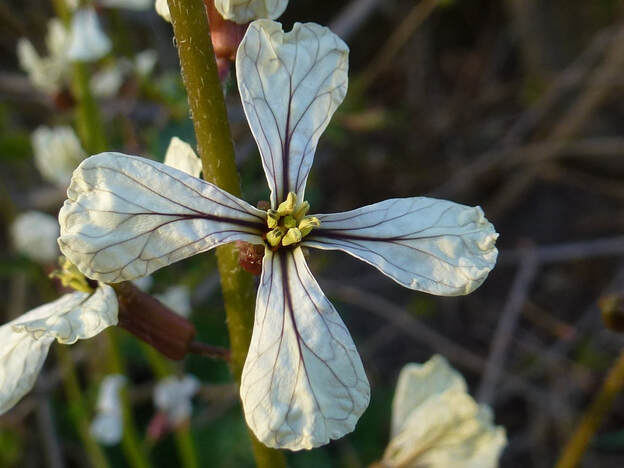

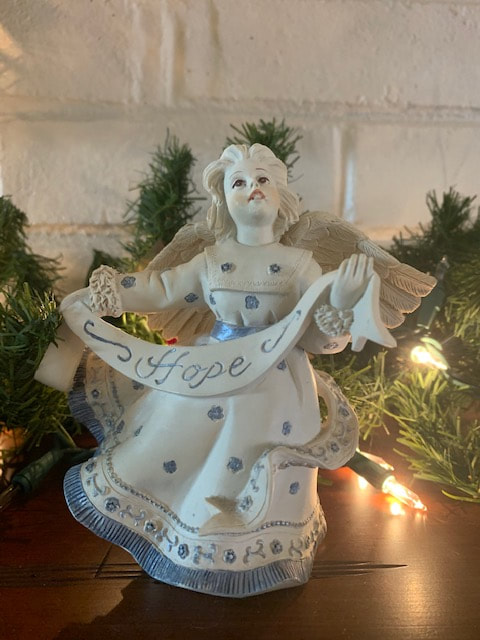


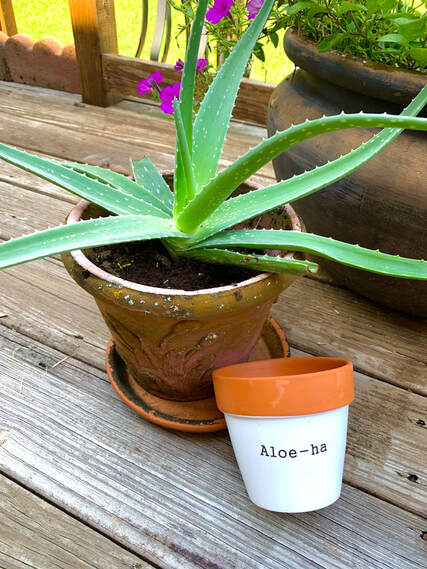


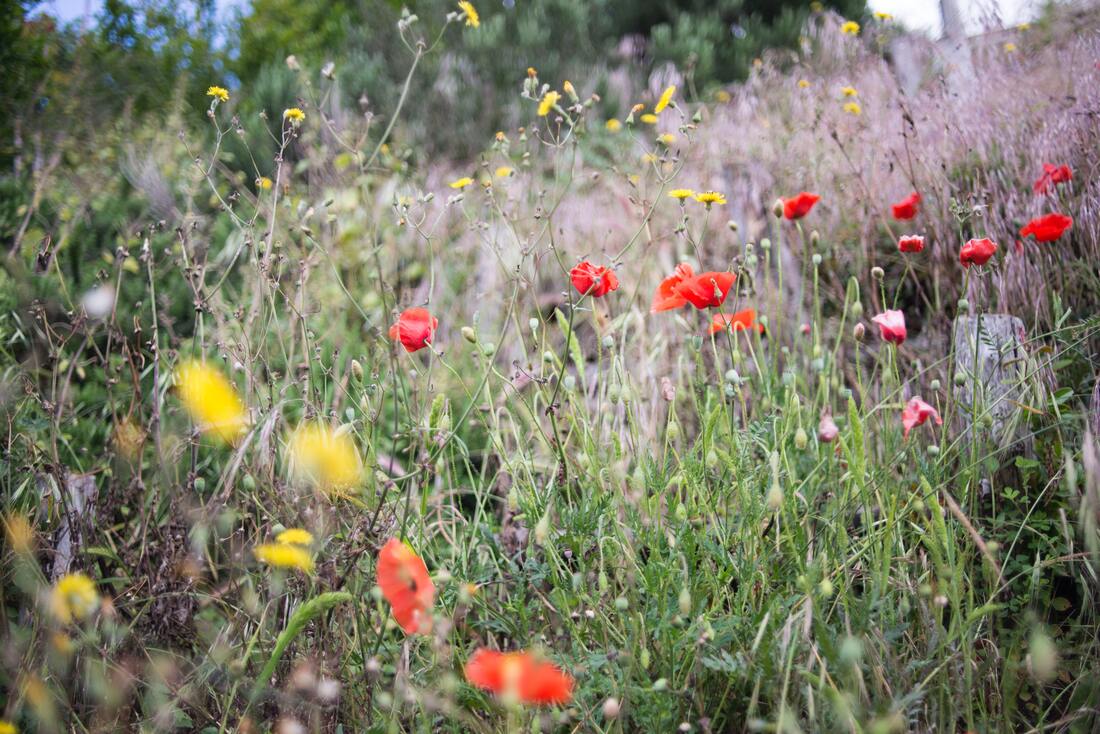


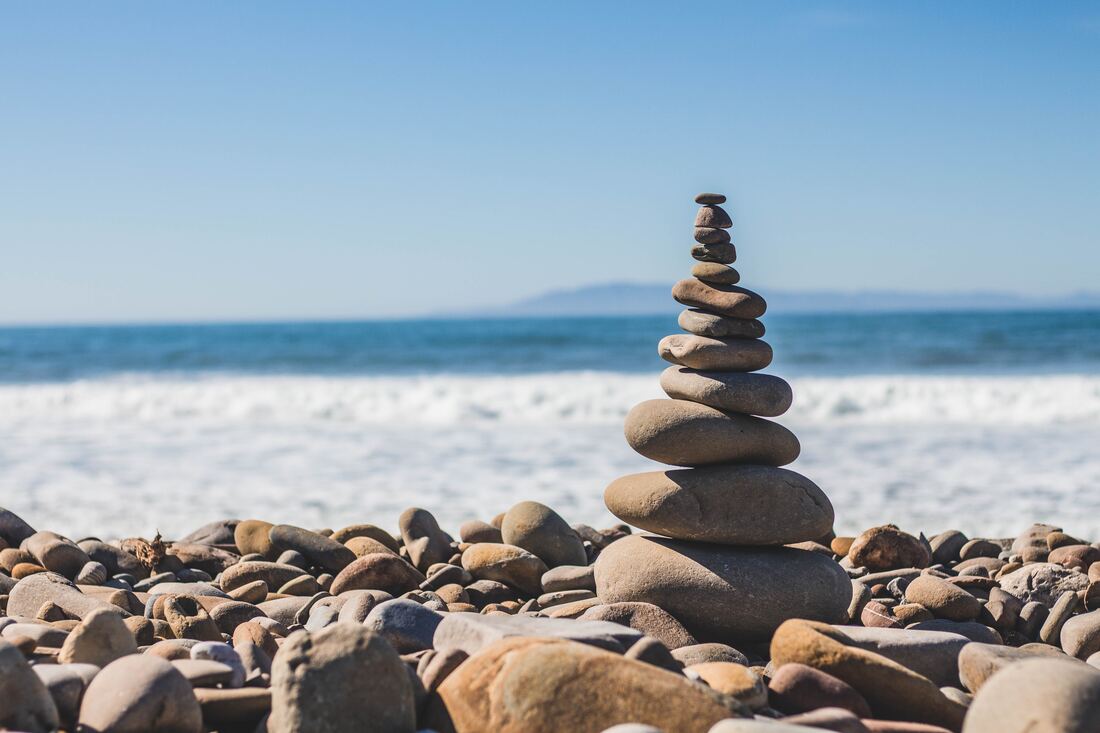



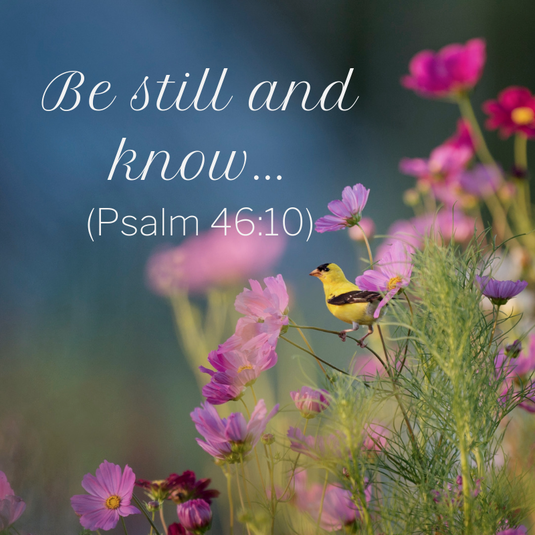
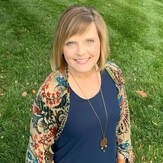
 RSS Feed
RSS Feed
